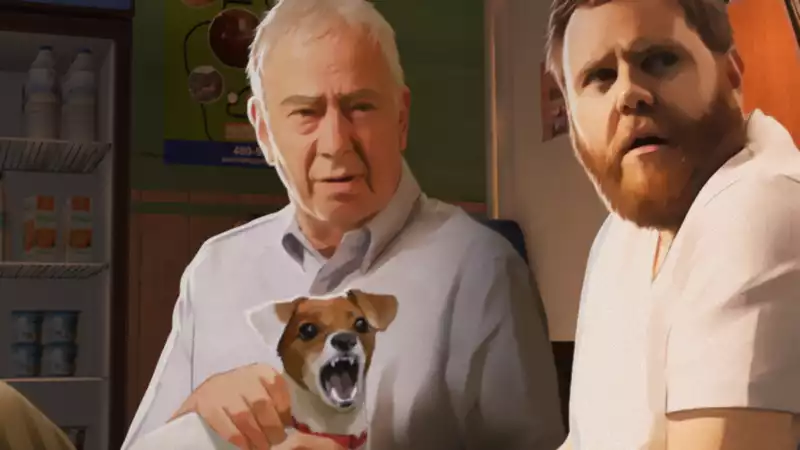At first glance, this is a hard sell for video game enthusiasts. You can't control your avatar directly; you have to do QTEs and make choices ....... But the limitations of this format are (mostly) turned into advantages here. While you may at first lament the loss of the ability to spin on the spot or jump around on the table during a poignant line, once you've played it, you won't want more than to see what happens next.
The story follows two very different families that clash during a siege at a small town motel. The Walker family is moving in, and the only thing to worry about is the tension between the mundane families. To describe more than that would risk spoilers and, in a game like this, might puncture the experience.
As a motion comic, full animation is almost non-existent. Instead, the comic panels are basically displayed one after another with subtle fade-in transitions. I was worried that this would ruin the atmosphere, but I got used to it almost immediately. It certainly helps that the script is razor sharp and the art is impressive, based on photographs of people actually acting out scenes.
The acting is also excellent. Separate actors are used for art and narration. For example, Vince Walker is visually Oliver Britten's actor, but the voice actor is Elias Toufexis (perhaps best known to gamers as Deus Ex's Adam Jensen). Toufexis does a great job, but his distinctive voice means that his father bears a slight resemblance to Batman.
Despite its limited nature, As Dusk Falls does feature multiplayer. I strongly believe, however, that it is best enjoyed solo. It can be played online by invitation only or locally via the app. The idea is that the player's choices are determined by a vote, a drama by democracy. If the idea appeals to you, that's great, but it's hard to deny that playing in this way can lose some of the intimacy and personal control over the pace.
These two words constantly flowed through the heart of the game as I played. The combination of a quality script and quality acting meant that I soon began to care about all the people and what happened to them, and more than once I agonized over decisions. I felt so close to the people, so close to the story, that I almost made decisions that I regretted. Similarly, the developers have complete control over the pace of the story because there is no possibility for the player to get lost or distracted in the game world.
I didn't mind the QTEs. In fact, I rather liked them. It is highly annoying that the game has not one but two dishwashing QTEs, but aside from that, the QTEs make sense and often add to the tension of the scene. Trying to outrun a pursuer on a bad road, rushing to wire a car, taking stubborn food off a plate, that sort of thing.
As I write this, it may sound like I love As Dusk Falls. But loving someone means that I have an obligation to point out important mistakes they have made. That's why I have to say that the ending sucks. [For the first time in my five years of freelancing, I swore in a review. I'm speaking specifically about the last scene, a scene that everyone gets regardless of prior choices. It's a scene that unfolds regardless of who dies, gets arrested, gets divorced, or forgets to do the dishes. It's cheap, lazy, and I hate it; sticking that scene on the end of As Dusk Falls is like sticking a Funko Pop on the hood of a Rolls Royce.
Still. Still. Still, I liked the way the first attempt at this story turned out (especially if you pretend the last scene didn't happen). Events and relationships had a messy and realistic ending. As the credits rolled, I was already thinking about what I would do differently next time, what kind of ending I would like to see, and how I would get there.
There were a few bumps leading up to the final sequence, but they were more potholes that caused brief bumps than landmines that would send the wheels flying. For example, one of the main drawbacks of visual representation, and one that could not be completely avoided, was that stationary faces do not express emotion as effectively as moving ones. For the most part, this was not a problem. However, on a few occasions - usually when the character was halfway through an expression in anger - there were expressions that made me laugh unintentionally.
There were also exactly two decisions that I felt needed a bit more work (without going into detail, of course). Still, the fact that only two of the decisions felt incomplete is quite impressive, given that we were faced with almost constant decisions, some of which were more important than expected.
And while the flashback sequences, like the rest of the game, are brilliantly put together, I must say that the tension is taken away from them because we already know that one or more of the characters will not die. This is because I am already running out of things I don't like about it.
If you're looking for a strong story that you'll want to replay at least once, and/or a bridge until the AAA dishwashing simulator we've all been waiting for comes out, this is very much your game.
.

Comments